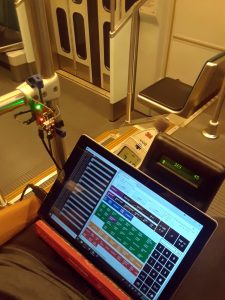In April 2018, our lab initiated a comprehensive snapshot survey of the MBTA light rail trains (Red, Blue, Green, and Orange Lines) in an effort to better understand the environmental conditions experienced by the hundreds of thousands of individuals who use the light rail system every day.
The project focused on measuring a range of environmental quantities in the train cars, achieved by the dedication of undergraduate student Edgar Castro in riding the T for hundreds of hours. A main goal of the work was capturing information simultaneously about multiple different parameters, including:

Expected lessons from this were were (1) to understand how these quantities varied across the light rail system and (2) to see whether any of these parameters might be correlated (e.g., do noise and vibration increase and decrease in sync?).
 The first round of surveying, completed in May 2018, sampled data for all of the above quantities and took place primarily after 9pm Sunday-Thursday. At the left you can see the setup as deployed in the MBTA Green Line.
The first round of surveying, completed in May 2018, sampled data for all of the above quantities and took place primarily after 9pm Sunday-Thursday. At the left you can see the setup as deployed in the MBTA Green Line.
A follow-up survey in October-December 2019 was done during both rush hours and hours with less ridership. In this case our goal was to compare particulate matter (PM) levels between peak and non-peak conditions.
All of the collected data are available at this website to allow members of the public to get a window into the conditions along their own, individual commutes. The website features a system assessment tool, where users can see the various levels of measured quantities across the entire system as a whole, and a commute assessment tool, where users can see the change in those levels along the optimal path between any two stations. All source code for the website, sampling tools, and Jupyter notebooks used for analysis are available on the Lab Github page.

This project had excellent collaborators at Northeastern University, the MBTA, and the MA DoT, including Dr. Matthew Eckelman, Nick Boyd, Norman Michaud, and Preston Horton.
Preliminary results were presented at the 2020 BARI Annual Conference on The Smart Equitable Commonwealth: Co-creating the Society We Want– all sessions are available here as podcasts.
A manuscript with more information on the study and results is currently in preparation (summer 2020).
